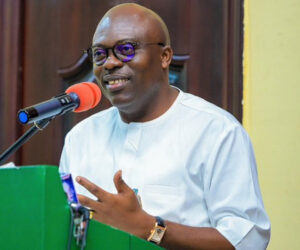
Retired Brigadier General Sani Usman has described the killing of 13 worshippers during morning prayers in Mantawu community, Malumfashi Local Government Area of Katsina State, as ‘worrisome and unfortunate,’ stressing that insecurity can only be tackled through a collective effort involving communities, local authorities and security agencies.
Speaking in an interview on Arise News on Wednesday, the retired general said:
“Really, the recent happening, particularly what happened in Gidamban Tau yesterday morning in Malumfashi Local Government Area, is quite worrisome and quite unfortunate where people worshipping were descended upon. You begin to wonder why, what brought all this? It is so worrisome because it is more or less like a local thing, so to speak, and these people are no spirits. They live within the communities. When you are dealing with security problems of that nature, it behoves on the leadership to ensure that it is a collective responsibility.”
He cautioned against leaving the burden of security entirely to the federal government, stressing the importance of vigilance and community action.
“There are a lot of drivers, a lot of enablers, and playing games is not the solution to the problem. Let’s face reality. The issue of security education, the issue of giving people a sense of belonging, is key. Take for instance what happened yesterday — there were reports that they saw some of them massing, gathering logistics, but nobody reported it the way it was supposed to be. Then of course you have this problem of informers, and not on the positive part of it but on the negative. They have understood the modus operandi of the security agencies. Even if you bring one million of them, given the vast nature, it will be very difficult to police everywhere. So the thing is that it’s a collective responsibility because these people live with the people, and there is a lucrative economy surrounding these security challenges.”
General Usman pointed to weak local government structures as part of the problem, arguing that effective grassroots leadership could help build resilience within communities.
“We know that the local government system is not working. People are not alive to their responsibilities to be there with the people so that they can coordinate them in such a way that there will be community resilience. Quite a number of things are wrong and I can see people just calling on the federal government, but at the local level what is it that needs to be done? At the wards, at the district level, at the local government, at the state, then you talk of the federal government. These are the issues,” he said.
On suggestions that reprisal attacks and self-help were becoming a growing trend, the retired general maintained that communities had a right to defend themselves but insisted synergy with security forces remained crucial.
“When we have to be realistic about this issue, given the vastness of the terrain and number of security agencies, it is very difficult to pretend. Therefore there must be complementary efforts on the part of the community, the society and the other tiers of government, not just the federal government. If there is a synergy of effort, if people at the local level are complementing the security forces, the issue of self-help will not come into play. But of course, community resilience is necessary. I came from that area — this attack took place less than 20 kilometres from my hometown. Right now, the number of internally displaced persons there is unprecedented. People can no longer keep cows, they cannot go to farm, they cannot go to worship, they cannot even go to the market. We need to arrest the situation by telling ourselves who are those involved and talking to them so that they see reason, because killings will not solve the problems.”
He admitted that kidnappings and banditry had become “a daily occurrence” in Katsina and beyond, warning that criminal informants and profiteers were fuelling the violence.
“The kidnappings and abductions have been a daily occurrence. The most important thing is how do we stop these kidnappings and killings by bandits? Each and every one of us has a role to play, especially the elites. The Commissioner has made reference to this sometime ago — he said 80% of the security challenges are activated by informants. It may surprise you to know there was a logistics supplier that was selling a bottle of Coca-Cola to bandits at the rate of ₦3,000, and petrol at ₦5,000 per litre. So it’s a lucrative business. But how do you stop it? We must tell people they should understand that it is not the money. Lives are being lost. Whatever you accumulate you will not take anywhere with it. Look at banditry — they collect ransom in millions of Naira, but where is the money? To the best of my knowledge, no investment has been done either in education, healthcare or religion. No mosque, no school, nothing.”
General Usman called for a combination of kinetic and non-kinetic approaches, greater intelligence gathering, and better protection for those who provide information.
“We need to live in peace so that there will be development. That is more than enough for each and every one of us. But this cannot be done unless we sit down and talk to ourselves, combining the kinetic and non-kinetic approaches. There is no excuse whatsoever for you to go and kidnap someone, or enslave people. The government ought to be alive to its responsibility, supporting the security forces in terms of logistics and ammunition. The recent successes recorded — the collaboration between Nigeria and Niger Republic, and the arrest of Ansaru leaders — all came through intelligence. Absolutely, it is intelligence, the use of technology and human intelligence. Those are the starting points. Cultivate local sources so they understand that it is their duty to give information to security agencies, not to criminals, and the government must also protect those who provide information and act on it.”
Boluwatife Enome
Follow us on:


![[VIDEO] Former CDS Irabor Delivers Lecture On Media, Terrorism And National Security At All Nigeria Editors’ Conference](https://nnu.ng/wp-content/uploads/2025/11/CDS-Irabor-1ci-e1763029983301-300x250.jpg)





